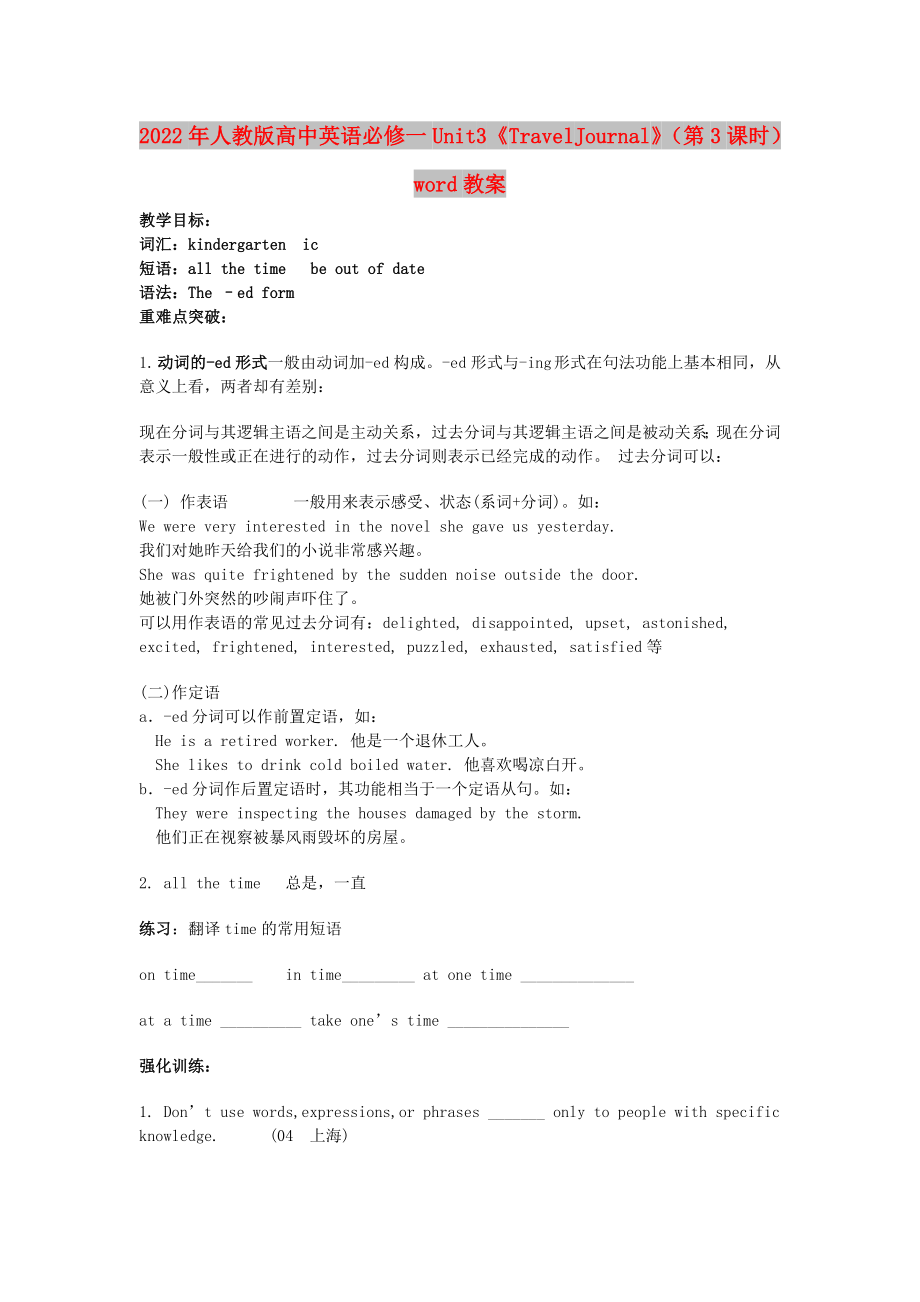《2022年人教版高中英語必修一Unit 3《Travel Journal》(第3課時(shí))word教案》由會(huì)員分享����,可在線閱讀����,更多相關(guān)《2022年人教版高中英語必修一Unit 3《Travel Journal》(第3課時(shí))word教案(2頁(yè)珍藏版)》請(qǐng)?jiān)谘b配圖網(wǎng)上搜索�����。
1�����、2022年人教版高中英語必修一Unit 3《Travel Journal》(第3課時(shí))word教案
教學(xué)目標(biāo):
詞匯:kindergarten ic
短語:all the time be out of date
語法:The –ed form
重難點(diǎn)突破:
1. 動(dòng)詞的-ed形式一般由動(dòng)詞加-ed構(gòu)成����。-ed形式與-ing 形式在句法功能上基本相同,從意義上看�����,兩者卻有差別:
現(xiàn)在分詞與其邏輯主語之間是主動(dòng)關(guān)系�����,過去分詞與其邏輯主語之間是被動(dòng)關(guān)系����;現(xiàn)在分詞表示一般性或正在進(jìn)行的動(dòng)作,過去分詞則表示已經(jīng)完成的動(dòng)作��。 過去分詞可以:
(一) 作表語 一般用來
2����、表示感受、狀態(tài)(系詞+分詞)����。如:
We were very interested in the novel she gave us yesterday.
我們對(duì)她昨天給我們的小說非常感興趣。
She was quite frightened by the sudden noise outside the door.
她被門外突然的吵鬧聲嚇住了���。
可以用作表語的常見過去分詞有:delighted, disappointed, upset, astonished, excited, frightened, interested, puzzled, exhausted, sat
3��、isfied等
(二)作定語
a.-ed分詞可以作前置定語�����,如:
He is a retired worker. 他是一個(gè)退休工人��。
She likes to drink cold boiled water. 他喜歡喝涼白開����。
b.-ed分詞作后置定語時(shí),其功能相當(dāng)于一個(gè)定語從句���。如:
They were inspecting the houses damaged by the storm.
他們正在視察被暴風(fēng)雨毀壞的房屋����。
2. all the time 總是�,一直
練習(xí):翻譯time的常用短語
on time_______
4、in time_________ at one time ______________
at a time __________ take one’s time _______________
強(qiáng)化訓(xùn)練:
1. Don’t use words,expressions,or phrases _______ only to people with specific knowledge. (04 上海)
A. being known B. having been known C. to be known D.known
2. Prices of daily
5�、 goods _______ through a puter can be lower than store prices.
A. are bought B. bought C.been bought D.buying
3. Don’t all speak at once! ______ ,please.
A. Each at one time B. One by one time
C. One for each time D. One at a time
4.— I’m afraid I can’t finish the book wit
6、hin this week.
— ______ .
A. Please go ahead B.That’s right
C. Not at all D. Take your time
5. The ____ look on his face suggested he _____ that.
A. surprised ; hadn’t expected B. surprising ; hadn’t expected
C. surprising ; hadn’t expected D. surprising ; wouldn’t have expected
6. The glass of water is too hot. I prefer some cold _____ water.
A. boiling B. boiled C. having boiled D. to boil
7. The book can be used in ____ countries.
A. English-spealing B. English-spoken
C. speaking-English D. speak-English
 2022年人教版高中英語必修一Unit 3《Travel Journal》(第3課時(shí))word教案
2022年人教版高中英語必修一Unit 3《Travel Journal》(第3課時(shí))word教案

